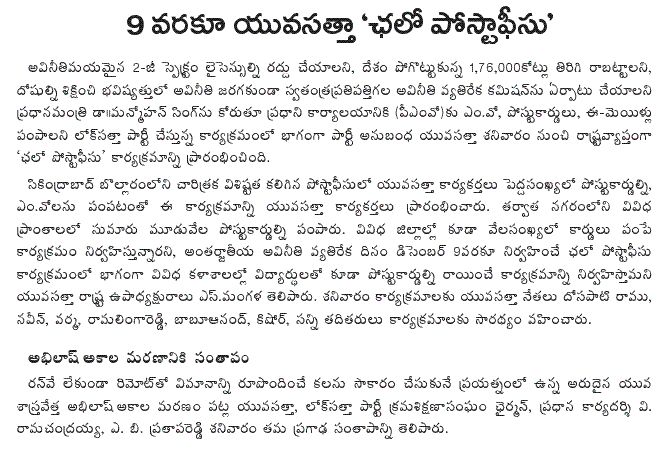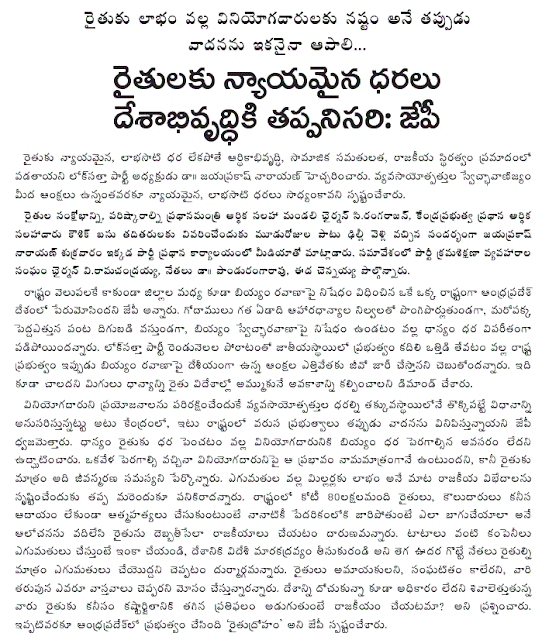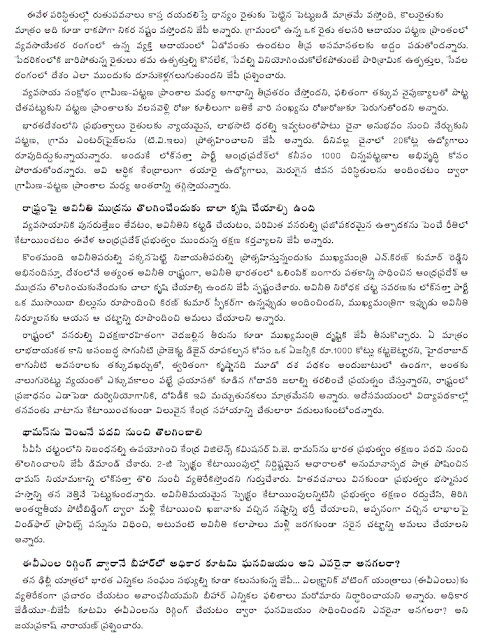Press Releases Archive
Free movement of rice, A farmers’ victory
The Lok Satta Party today described the Andhra Pradesh Government decision to lift all restrictions on movement of fine rice and paddy as the first victory of the non-party movement it launched on behalf of farmers.
Addressing the media, Lok Satta Party Working President D. V. V. S. Varma and Party leaders Katari Srinivasa Rao, P.Bhaskara Rao said that Government Order No. 58 facilitated free trade in fine rice and paddy throughout the country. The State Government should now persuade the Union Government to permit export of rice to other countries too.
With last year’s stocks occupying the entire space in Government and private warehouses and farmers registering record yields now, the open market price of paddy has crashed below the Government’s minimum support price. Now that rice millers can sell rice anywhere in the country by moving it by road, they should buy paddy by offering at least the minimum support price.
The Lok Satta leaders demanded that the State Government announce a bonus of Rs.200 a quintal of paddy above the minimum support price considering the escalation in cultivation costs. They also wanted the Union Government not to succumb to textile industry pressures for halting cotton exports.
Fair prices to farmers a must for Country’s prosperity: Dr. JP
Economic growth, social cohesion, and political stability will be in jeopardy if the farmer is not ensured a fair and remunerative price for agricultural produce, warned Lok Satta Party President Dr. Jayaprakash Narayan here today. Fair and remunerative prices cannot be ensured as long as there are restrictions on free movement of agricultural produce, Dr. JP added.
Dr. JP was addressing the media after a three-day visit to Delhi to espouse the cause of distressed farmers with Mr. C. Rangarajan, Chairman, Prime Minister’s Economic Advisory Council, Mr. Kaushik Basu, Chief Economic Advisor to the Union Government, and others.
Dr. JP disclosed that Andhra Pradesh enjoyed the dubious distinction of being the only State in the country that banned movement of rice not merely outside the State but even between districts within. With Government and private warehouses overflowing with last year’s stocks and a bumper harvest round the corner, the ban on free movement of rice has depressed the paddy price.
Dr. JP pointed out that successive Governments at the Center and in the State have stuck to a policy of keeping agricultural prices depressed invoking the bogus plea of safeguarding consumer interests. The price of rice for the consumer need not necessarily go up with an increase in the price of paddy for the grower. Even if it were to go up, its impact would be marginal to the consumer, whereas it makes a life-and-death difference to the farmer.
As of today, owner cultivators are able to recoup the costs of paddy cultivation barely whereas tenant cultivators are incurring a cash loss. The per capita income of a farmer in a village is one-seventh of that his urban counterpart engaged in non-farming activities. How can the nation leap forward in manufacturing and services if impoverished farmers cannot afford the products and services offered by the former?
The agrarian crisis has deepened the rural-urban divide, and accelerated migration of low skilled labor to urban areas.
Apart from ensuring fair and remunerative prices to farmers, Governments in India should take a leaf out of Chinese experience and promote town and village enterprises, which have resulted in the creation of 200 million jobs. That is why the Lok Satta Party has laid emphasis on creating at least 1000 new towns in Andhra Pradesh. They will serve as economic hubs and bridge the rural-urban divide by providing jobs and better living conditions.
Dr. JP said that the top most priority for the Andhra Pradesh Government should be rejuvenation of agriculture, reining in corruption, and optimum allocation of scarce resources.
Complimenting Chief Minister N. Kiran Kumar Reddy for sidelining some of the corrupt and encouraging the honest, Dr. JP said the State had to go a long way in living down its image as the most corrupt State in the country. The Lok Satta Party had prepared a draft Bill to amend the Prevention of Corruption Act and submitted it to Mr. Kiran Kumar Reddy when he was Speaker. As Chief Minister, he should follow it up to eradicate corruption.
Dr. JP also drew the Chief Minister’s attention to rampant misallocation of resources in the State. He cited just two instances -- payment of Rs.1000 crore to an agency for preparing a detailed project report for an unviable and unprecedented irrigation project and dogged persistence with the costly, unreliable, and time-consuming Godavari water project to meet the drinking water needs of Hyderabad. At the same time, the Government is forgoing precious Central assistance by failing to allocate its share of funds for educational schemes.
Dr. JP demanded that the Government of India sack or suspend the Central Vigilance Commissioner, Mr. P. J. Thomas, by utilizing the provisions in the CVC law. He recalled the Lok Satta had faulted his very appointment, as his role in the 2-G spectrum allocation was not above board. The Government should cancel all tainted spectrum allocations, recoup the loss to the exchequer through fresh allocation on competitive bidding, tax windfall profits and enact a law to prevent such misdeeds in future.
Dr. JP, who met Election Commission of India members during his Delhi visit, said that the Bihar results once again established the campaign against electronic voting machines was unwarranted. Would any one now say that the ruling JDU-BJP combine registered its landslide win by rigging EVMs?




